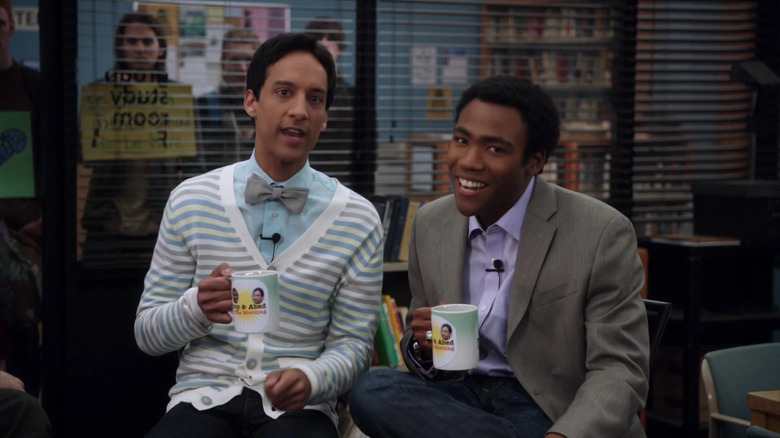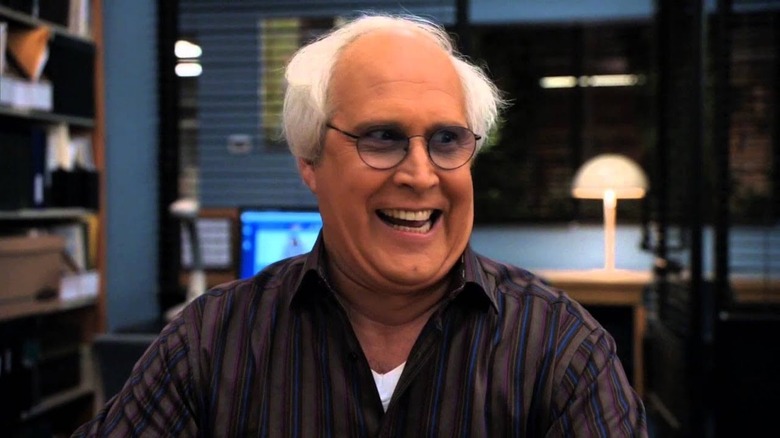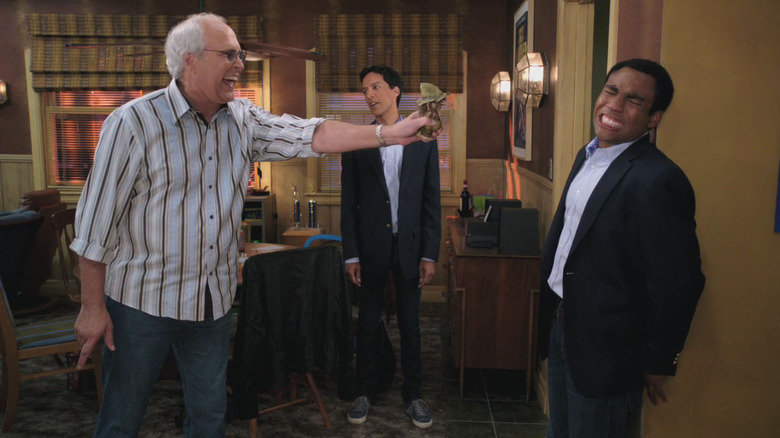Dan Harmon Originally Wanted Community's Chevy Chase And Donald Glover To Be Like Beavis And Butt-Head
One of the best parts of "Community" is the friendship between Troy (Donald Glover) and Abed (Danny Pudi), that develops almost by accident throughout the first season of the show. Although Troy was originally written as a conceited jock who looked down on Abed's nerdier, more socially-inept tendencies, by the second half of the season, they were close friends. By the time we got to season 3, the two were pretty much inseparable. A lot of the post-credits scenes in the show's golden era centered around these two doing their fake morning show ("Troy and Abed in the morrrrrrning!"), and when Troy left in the middle of season 5, Abed had a whole mental breakdown where the floor genuinely looked like lava to him.
Before these two became an unstoppable duo, however, the original plan in the writers' room was to pair Troy up with Pierce, played by Chevy Chase. This is why the two were seated next to each other in the pilot episode. According to creator Dan Harmon, "Before we started shooting, the writers made a decision that Troy and Pierce would be the Beavis and Butt-Head of the ensemble, always getting up to no good and egging each other on."
'He's a soloist'
As the season went on, however, it was quickly decided that Chevy Chase worked better playing more of a solo character. Dan Harmon explained to the Independent, "It seemed like a natural fit, but even the most ardent Chevy Chase supporter would say he's a soloist. Sticking him with another person and saying you guys are going to be Abbott and Costello — it was naïve."
Instead, Pierce slowly developed into the antagonist of the group, acting on his own to wreak havoc for the rest of them. Although season 1 mostly had him make out-of-touch old man jokes that the rest of the group groaned at, season 2 escalated his behavior to a full-blown villain. He guilt-trips Annie into ruining her own anti-drugs play, he emotionally tortures the rest of the study group in "Intermediate Documentary Filmmaking," and in a rage of jealousy, he mercilessly bullies the unfortunately-nicknamed Fat Neil in "Advanced Dungeons & Dragons." In the "D&D" episode in particular, Chevy Chase's performance was so evil, it was genuinely unsettling, especially considering the character he was bullying was implied to already be suicidal.
Pierce's descent into villainy culminates in season 2's two-part paintball finale, which establishes that Pierce is on the verge of being kicked out of the study group for his year-long reign of terror. Although Pierce redeems himself in the end by winning the big paintball battle for the school, he ultimately chooses to leave the study group himself. As he says:
"You know I've been coming to this school for 12 years? And I've never been friends with anyone here more than a semester. Probably for the same reason I've been married seven times. I guess I assume, eventually, I'll be rejected. So I, you know, test people, push them, until they prove me right."
Pierce's slide into irrelevancy
It's an emotional moment showing us how Pierce's evil came from a sympathetic place of loneliness and insecurity, one that's undercut slightly by Pierce walking back into the study room at the start of season 3 as if nothing happened. Pierce isn't as evil in the next few seasons. Instead, he becomes increasingly irrelevant to the group, disappearing almost entirely by the end of season 4 and getting killed off at the beginning of season 5.
It should be noted Pierce's departure was also due to the growing conflicts between Chevy Chase and the rest of the cast (as well as Dan Harmon), but also because of the organically growing prominence of Troy and Abed. The two started living together in season 3, and their undeniable comedic chemistry drew up more and more of the show. As Danny Pudi explained:
"Donald Glover and I clicked right away. One time we were doing an interview and started freestyle rapping to distract from whatever question we'd got. From that, I think Dan got inspired to write the 'La Biblioteca' rap and those end-tags took off. Donald's such a brilliant improviser. Sometimes we were just given a premise and would run with it. Yvette mentioned that Donald and I were like Bert and Ernie."
Another explanation for Pierce's lack of prominence in the later seasons is simply that it works for his character arc. After season 2, Pierce makes peace with his old age, and he has let go of his self-destructive need to push people away before they do the same to him. He's accepted that the study group has accepted him, warts and all. That Pierce is comfortable simply existing within the study group is a nice way of making his season 2 arc feel meaningful. Pierce has grown to be a better person and he improves himself quietly, without the show making a big sappy point about it. He's still capable of engaging in petty acts of evil (see: the entirety of "Cooperative Polygraphy"), but when it's time for him to go, he's improved enough that there's now plenty about him to mourn. RIP Pierce.


